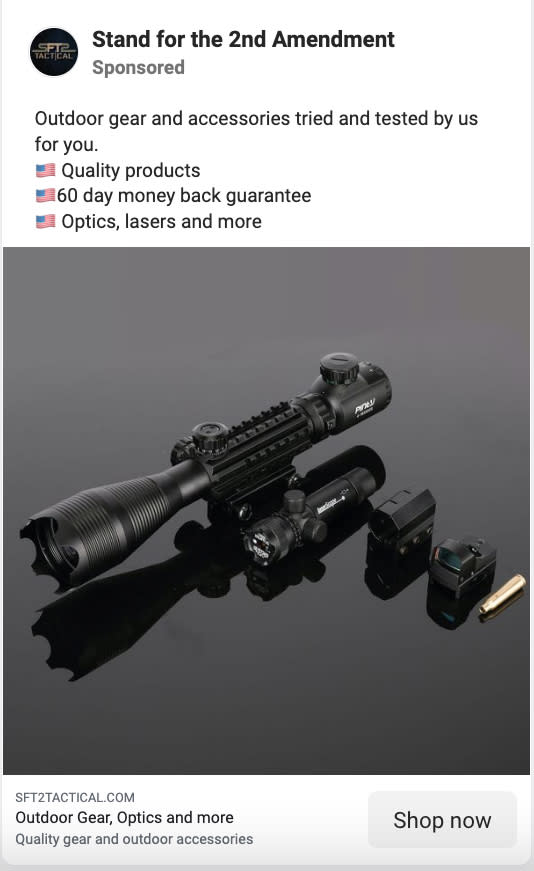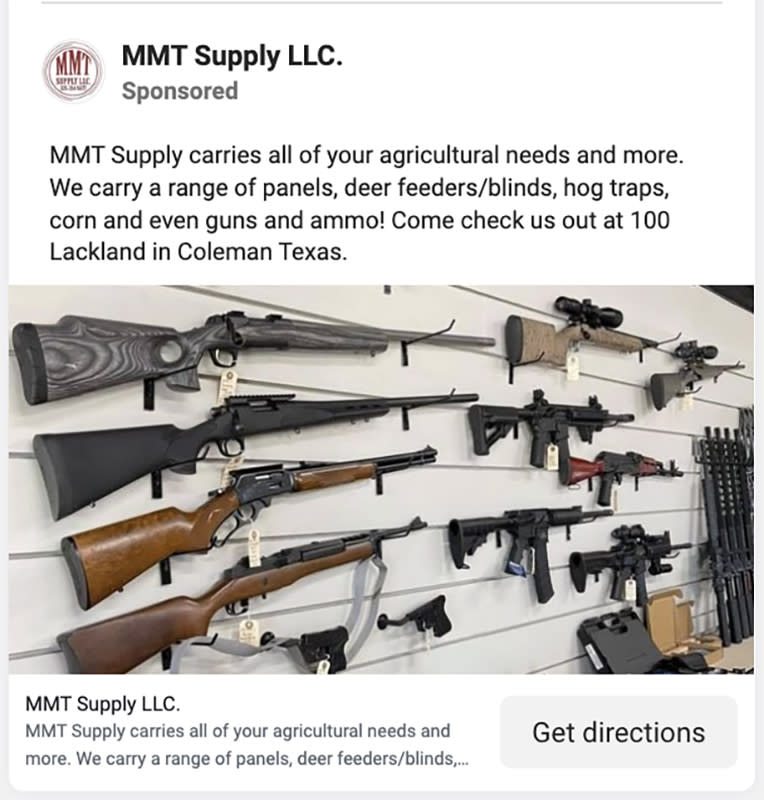Facebook’s rules ban promoting weapons. Some gun sellers are running ads anyway.
Gun retailers are running ads promoting firearms for sale on Facebook and Instagram, a tech industry watchdog said Wednesday in a report that shows apparent holes in how the apps enforce their own rules against ads that promote the use or sale of weapons.
The Tech Transparency Project said in its report that it found 173 ads that it believes violate the apps’ ad policies by searching the apps’ online ad library over two weeks in August.
Meta, the parent company of Facebook and Instagram, prohibits ads that “promote the sale or use of weapons, ammunition or explosives,” according to the company’s online rulebook. The prohibition also covers “weapon modification accessories,” such as gun sights.
But in an example from the report, a Texas gun shop bought an ad for “guns and ammo” with a photograph showing a wall of firearms. In another example, an online retailer that specializes in scopes and other gun accessories ran an ad for “optics, lasers and more.” A third example from a Kansas gun store and gunmaker showed an AR-15-style rifle.

While the ads represent a small fraction of all the ads that ran on Facebook and Instagram in the U.S. during that period, the Tech Transparency Project said that its search wasn’t exhaustive and that the fact that the ads made it through a review process at all demonstrates that the system is flawed.
“These ads are appearing to slip through the cracks pretty easily, and it raises a lot of questions about what their approvals actually look like,” said Katie A. Paul, the director of the Tech Transparency Project.
Facebook said the number of ads at issue was small relative to its size.
“This report uses a tiny sample size of 173 ads out of millions of ads that run across our apps to paint a misleading picture of the experience that most people have every day,” Meta spokesperson Dani Lever said in a statement.
“In reality, the vast majority of people using our apps never actually see ads that violate our policies against weapons or firearms,” she said.
The company declined to comment on specific ads until it had seen the full report, which the Tech Transparency Project provided to NBC News ahead of releasing it.

Meta relies largely on automated systems to review ads, and it has some human reviewers.
“We have robust systems for reviewing ads against our policies before they go live and quickly correct any violations that slip through by mistake,” Lever said.
Most of the ads are no longer online, because Meta’s ad library shows ads only if they’re currently running or are about politics, a practice that Paul said limits transparency. Meta has also sometimes tried to shut down outside research on its ad system that the company has said it sees as a data and privacy risk.
Paul said she believed there are likely to be worse violators her project didn’t find.
“This was over just a two-week period in the United States in English,” she said. Meta says it has 3.65 billion monthly active users across its suite of apps.
“The Facebook universe is large, and usually when we zoom out looking at some of these issues, historically it gets worse the further out you go,” Paul said.

Gun ads have tripped up Facebook and Instagram for years, according to outside investigations. Sellers have posted gun “cases” for sale at inflated prices to disguise that they’re offering firearms, and last year Facebook showed gun-accessory ads to people interested in the Jan. 6 attack on the U.S. Capitol. Facebook lets buyers and sellers violate its rules 10 times before they’re kicked off, The Washington Post reported in June.
Gun stores are used to trying to work around Meta’s rules, said Morgan Tibbetts, the owner and operator of MMT Supply, the Texas gun shop with the “guns and ammo” ad.
“I have friends that run gun stores, and they get away with things like this all the time,” she said.
Tibbetts said Facebook has frozen her account at least three times in the past four months, but for a different reason: accusing her of being a “peer-to-peer” seller, even though, she said, she has a federal firearms license. She said the company’s rules are biased against firearms that are protected under the Second Amendment.
“If we are federally regulated, and we do everything by the books, why should we be treated differently than a clothing business?” she said.
Dan Porter, one of the owners of Stand for the 2nd Amendment Tactical, the online retailer with the “optics, lasers and more” ad, said the ad is no longer running. The website doesn’t sell firearms, only accessories.
“Our advertising team has no intentions to run any ad that does not comply with Facebook’s policies,” he said in an email. “Facebook has continuous changes and updates with their ad policies. We will continue to follow them closely.”
Kip Gardner, the owner of KG Gun Works in Clearwater, Kansas, said he thinks his ad about an AR-15-style rifle complies with Meta’s rule about promoting “the sale or use of weapons” because he’s not selling on Facebook itself and the ad doesn’t mention “use” of the weapon.
“It’s seldom, if at all, that I’m advocating the use of the weapon,” he said. “It’s simply a notification to those that are interested that these are the new products, and that’s pretty common throughout the industry.”
Paul, of the Tech Transparency Project, said that if Meta can’t catch more potentially rule-breaking ads, it should hire more people rather than rely on journalists and nonprofit groups to find them.
“What other things are slipping through the cracks?” she said. “Is their machine learning as good as they say, or are they pulling the veil over the eyes of the public and Congress again?”
And she said she feared the problem could get worse after Meta CEO Mark Zuckerberg announced plans to slow hiring in the face of a potential economic downturn.
This article was originally published on NBCNews.com

